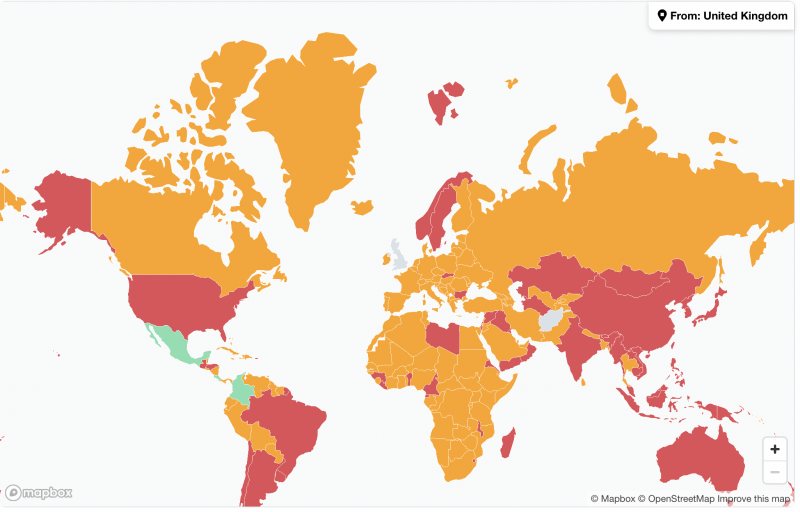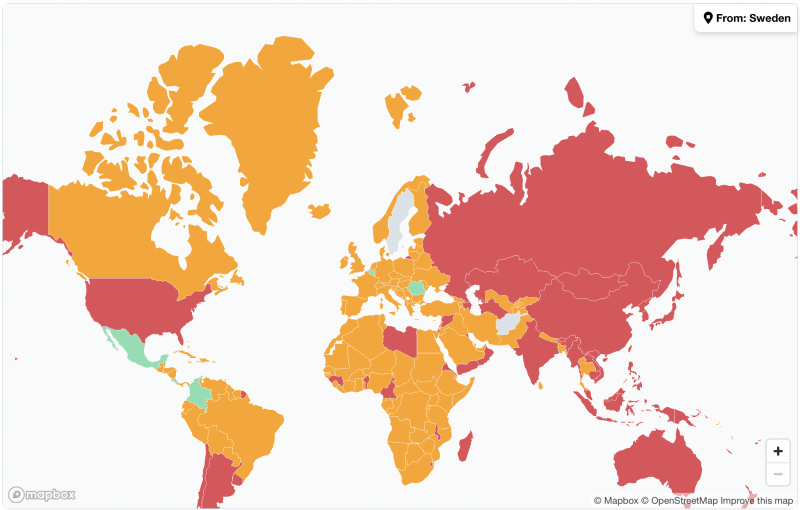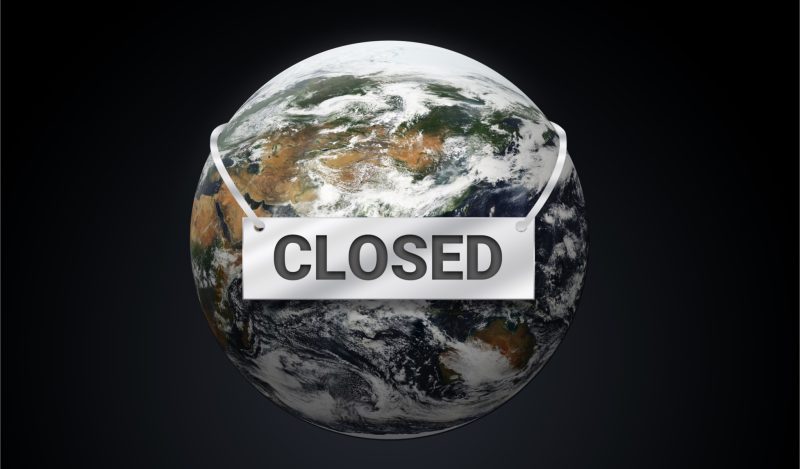On matters epidemiological, I’m a dedicated follower of Professor Sunetra Gupta of Oxford University, scientist and novelist. It was she who granted me a broad understanding of the relationship between society, freedom, and infectious disease.
She explained the urgency to get this right lest we recreate and institutionalize a caste system that delineates one group from another based on perceived cleanliness and thus harms everyone while setting back human rights and freedoms.
Looking at data only gets one so far. We all need deeper understanding. She gave me that.
Also, she is a wonderful person.
So of course I wanted to bring Sunetra to the United States for a Brownstone Institute event. She is a hero among many in the United States, and people deserve to meet her and get her thoughts. She lives in London. It’s a nice flight from there to here. Why not?
It cannot happen, at least not now. Since March 2020, UK citizens cannot travel to the US unless they have some special exemption granted by the US government. I’m not even sure I would know how to obtain that. I’m guessing that the Biden administration is not likely to grant an exception for her.
So we are stuck. She is stuck. Here is the map of the world from the point of view of UK travelers. Only Mexico and Colombia are fully open. The states in orange are restricted. The states in red are closed.

Hundreds of millions of people are stuck. Billions. We are all prisoners at some level and in some ways. We cannot have guests visit us from Europe. In retaliation, Europe is mostly closed to the US. The US has loosened restrictions for Australians but Australians are not allowed out. Or have a look at Sweden, one of the few states in the world that did not lock down. They are not allowed to travel much at all outside their own borders due to restrictions from other nations.

Why some nations are open, and others are not, is a mystery. There does not seem to be any rational reason except for vague claims of the need to be safe from Covid. Our governments did this to us. They intervened in a world of happy world travelers and smashed it, in the name of controlling a virus that is absolutely everywhere and has been for two years.
There is no precedent in modern history for such restrictions. There is also very little debate about this, which is shocking. The world spent decades in outrage about the closures between East and West Germany. Tear down this wall! When the Berlin Wall fell, the whole world celebrated. Now the world is filled with walls, not just to migration (though it’s bizarre that the US actually has huge immigration inflows from the Southern border) but even to normal travelers.
Much of this began January 31, 2020, when Trump banned travel for non-US citizens from China. It was a controversial decision within the administration, even among public-health experts, because it had long been conventional wisdom that such travel bans are harmful.
The virus was already here and spreading, though in those days the US had very little testing and so Trump believed that he could perhaps keep the virus out. He was wrong about that. Even so, I recall some people on the left objecting but the travel ban connected with many people’s intuition that the way to deal with a virus is to force some kind of separation.
That travel ban unleashed two habits of thought that ended up driving the rest of the lockdowns.
The first habit was to believe that the virus is over there but not here. It doesn’t matter where the “there” and the “here” is; it’s just a reflection of a primitive belief that “they” are dirty and “we” are clean, or that the virus is some kind of miasmic fog floating somewhere where we are not. If you live in the miasmic zone, some of the bad air might stick to you. This later came to be the driving impulse behind state-level quarantines and restrictions.
You probably noticed this yourself. No matter where you live, the people there always imagined that they were in some kind of disease-free bubble that could be easily penetrated by invaders. This attitude still persists. In the Northeast of the US, vast numbers of people are somehow convinced that Texas and the South are full of disease, such that if you travel there and come back, you are likely carrying this virus. And this isn’t just about the vaccination rates; this habit of mind was there from the beginning.
That connects directly with the second habit of mind: the belief that the way to control the virus was via human separation. One you start to think this way, the logic becomes unstoppable. It’s not just about the Chinese. It’s about everyone outside the border. Outside the state. Outside the county. Outside the neighborhood. Outside the home. Outside this room.
The implications of this view are profound. It impacts directly on the possibility of human freedom itself.
On March 12, 2020, Trump announced the next step, which shocked me but should not have. He blocked all travel from Europe. He said this would reduce the threat and ultimately defeat the virus – a statement that embodies his highly confused views on this matter from the beginning. He also garbled a sentence that ended up having a devastating economic result. He meant to say that the ban would exempt goods. Instead he said the following: “These prohibitions will not only apply to the tremendous amount of trade and cargo, but various other things as we get approval. Anything coming from Europe to the United States is what we are discussing.” The stock market immediately tanked.
I had no idea that the US president even had such power. I certainly never imagined he would use it. On the other hand, it made sense in a crazy way. If he could stop travel from China to keep the virus out, he could stop travel from anywhere. As a result of one man’s decision, world travel and vast amounts of normal commerce came to a halt.
The virus circulated anyway, not only in the US but everywhere in the world. These days the world makes fun of places like Australia and New Zealand where they imagined that they could somehow keep the virus out by controlling people’s movements in and out of the country. But that is precisely what Trump was doing too!
As a result of his edict, millions of Americans living abroad desperately bought tickets to get back to the US before the ban went into effect. They arrived at international airports that were wildly crowded at all the immigration and customs chokepoints. The waits in Los Angeles and Chicago were many hours, even up to 8 hours, standing shoulder to shoulder with people who had flown in from all over the world. This was happening the same day that Drs. Fauci and Birx were lecturing Americans to “socially distance” and stay away from other people in order to control the virus. The whole scene was emblematic of two years of policy chaos, with leaders ordering people around in ways that made the chaos worse rather than better.
During the remainder of the Trump term, between March and January, people inside the administration were trying their best to stop these preposterous rules. But there was always a problem. The danger was that opening up travel again could somehow be associated with increased cases and deaths from Covid, and that contact tracing would be deployed to show it. In that case, whomever was responsible for reopening would catch the blame. No one inside the Trump administration was willing to take the risk. So everything stayed shut.
The Biden administration could have opened also but the same problem presented itself. The borders were shut to the world, and no one wanted to take the risk of reopening, even though the virus was already here, there, and everywhere. Opening would not have made any difference. Would it have increased the “spread” of the virus or its prevalence? Not any more than was already the case.
Further, we know for sure that being exposed to the virus is the best means to obtain immunities from it, from which we get the counterintuitive conclusion that it would actually be safer for everyone to have people travel here from countries that had already dealt with the virus. After the vaccine came along, one might have supposed that there would be opening at least to those who took the jab, but there was another problem: the gradual realization that the vaccine doesn’t actually stop infection or spread. Thus are the borders still closed to this day.
There was no consensus in public health for the travel bans. On March 2, 2020, 800 public health experts signed a letter that recommended against them. “Travel restrictions also cause known harms, such as the disruption of supply chains for essential commodities,” they wrote, while citing a piece in Science Daily that reviewed thousands of studies on travel bans that was unable to come up with any conclusive evidence that they accomplish anything in terms of disease containment.
Already back in 2006, Donald Henderson had echoed the conventional wisdom, not only of his colleagues but also of the World Health Organization.
Travel restrictions, such as closing airports and screening travelers at borders, have historically been ineffective. The World Health Organization Writing Group concluded that “screening and quarantining entering travelers at international borders did not substantially delay virus introduction in past pandemics . . . and will likely be even less effective in the modern era.”
Similar conclusions were reached by public health authorities involved in the international efforts to control SARS. Canadian health authorities report that “available screening measures for SARS were limited in their effectiveness in detecting SARS among inbound or outbound passengers from SARS-affected areas.” A review by a WHO Working Group on SARS also concluded that “entry screening of travelers through health declarations or thermal scanning at international borders had little documented effect on detecting SARS cases.”…
It is reasonable to assume that the economic costs of shutting down air or train travel would be very high, and the societal costs involved in interrupting all air or train travel would be extreme.
The longer these restrictions exist to travelers from other countries, the more resentment that foreign nations feel. They are retaliating. Indeed, states all over Europe have removed the US from the list of countries to which it is considered safe to travel. Even Sweden is in on the act, banning nonessential travelers from the US. The restrictions are getting worse, not better.
The US could end this escalation of restrictions that have shut down the beautiful world of travel simply by reopening to the world, same as was true before the Trump administration embarked on this wild experiment. The emergence of global travel in the 20th century – its universal availability and practice – was one of the great triumphs of liberalism and modernity.
We rejected the isolation, parochialism, and local stagnation of the past and sought out knowledge and adventures all over the globe. We encountered new people, new places, new experiences. The world became open to all, thanks to commercialized flight. This also generated an incredible positive externality for public health. More exposure to the world improved immune systems for individuals the world over – a point first made to me by Professor Gupta.
Then in an instant it was closed. International tourist arrivals are down by 85% from 2019. A third of the world’s borders are shut. There seems to be no movement in the direction of reversing this disaster and reinstituting the wonderful world of 2019. In fact, there seems to be very little awareness that this has happened to us much less of the terrible consequences. Forget the freedom of movement; the Biden administration has only promised to open up “when it is safe to do so.”
Why is there so little controversy about this and no real political pressure from anyone to do something about it other than a handful of business lobbyists? It’s like many other aspects of lockdowns. Both parties and ideologies are implicated in them. If everyone’s hands are dirty, there is no one available to clean up.
Sunetra Gupta is one person among billions who cannot come to the United States by virtue of having the wrong citizenship identity and passport. She is locked out, in the name of virus control. There should be outrage, and would be if the restrictions on travel did not compete with so many other policies worthy of outrage.
Published under a Creative Commons Attribution 4.0 International License
For reprints, please set the canonical link back to the original Brownstone Institute Article and Author.









